As a math teacher, I think about data quite often. The internet provides us with so much data about so many things, that I feel it’s important for students, and teachers, to be able to collect, organize and analyze data. Every time I teach a Statistics unit in my math classes, I explain to students that knowing how to analyze different types of data is way more useful than learning calculus.
I keep endless amounts of data on the students — exams, performance tasks, historical comments. It is my belief that data can connect me to my students and how they learn. Most importantly, it helps me to reflect on my teaching practices.
I realized quickly that looking at exam scores at the end of a unit wasn’t helpful for myself or my students. I have always incorporated formative assessments into my lesson, however, I wanted a way to gather formative data and analyze individual students and class trends. That way, I can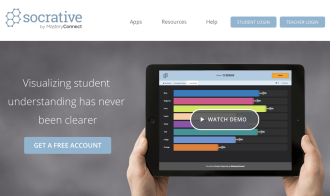 conjure up conversations with students and provide them evidence with the standard they have not quite mastered. This is where Socrative, an online quiz platform and mastery tracker comes into play. It allows students to engage in fun and interactive quizzes while tracking their data for me to analyze.
conjure up conversations with students and provide them evidence with the standard they have not quite mastered. This is where Socrative, an online quiz platform and mastery tracker comes into play. It allows students to engage in fun and interactive quizzes while tracking their data for me to analyze.
Why I like Socrative:
- Socrative is easy to use. It’s intuitive.
- It allows for multiple choice, short answer, and true or false questions, all gradable
- There is an option to upload images to questions (great for multiple content areas)
- Quizzes can be saved and shared with other teachers
- All reports and data is housed and is available by email, drive or by download. You can access full class and individual student data this way.
- Teachers can see in real time what/how students are answering specific questions
How to Use Socrative:
After creating a teacher account, you will be assigned a room number, and you can being creating quizzes and formative assessments.
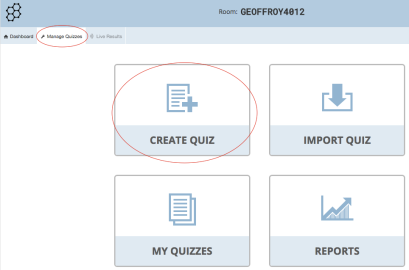
I like to make a quiz assessing students on what they have learned the previous class (I call them entrance tickets). Students sit down, take out their computers and log in. I will have already set up the quiz on my computer.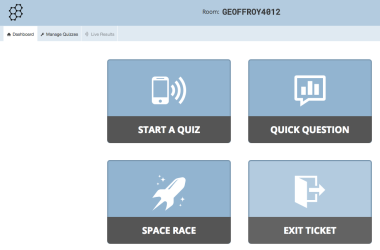
There are different options for types of quizzes depending on the needs of the formative, you can choose the style of quiz. I like the student paced – immediate feedback when I have students complete an entrance ticket. When I am having student practice a new skill during class, the space race is a great way to get high engagement and useful data on students and their levels of mastery. The exit ticket is a great, quick tool to get a picture of how your class mastered a standard/topic taught. And, they get to use their phones or computers, so it’s fun for them!
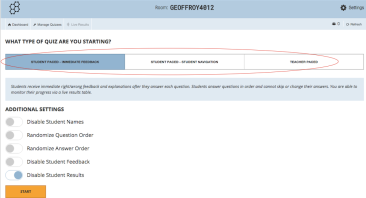
Making Use of the Reports:
For me, the best part of using Socrative is the reporting section. For each class and quiz taken, I save the reports to my Drive. I can use excel and make graphs with the data, see trends in specific questions, assess my teaching and their learning. 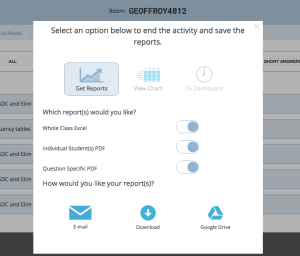
Ever further, I can share the individual student reports with the respective students. The data is now in their hands. They are able to look through their pdf and see which questions they got wrong and identify their strengths and weaknesses within a standard or topic. That way, they can work towards mastery on specific questions. The students also have an idea of how they stand in regards to the unit assessment. Essentially, it puts the ownership of learning back into their hands.
I would highly recommend Socrative as formative tool for many grade levels and certainly many different content areas. A goal for myself in the future is to start having students keep track of their scores and formatives in a data folder, so there is a visual element that will help them reach their goals throughout a lesson.
How do you use data in your classroom? Any tips, suggestions, strategies that have worked?

Andrea, this looks like such an awesome tool and your explanation is clear, straightforward, and easy to understand. Like you said, there could be so many applications for this, and I really think this is a tech tool that I’ll be trying out in my classes. Was it difficult to implement in your classes? Is the interface intuitive enough for kids to know what they need to do, or did you have to take time to explain how to use it to them?
Your blog post is formatted so well, and I appreciate the screenshots you included. I would have loved to be able to enlarge the photo with the different kinds of quizzes, though.
LikeLike
Hi Andrea,
I like the way you use Socrative at the beginning of the class to quiz the students on what they have learnt previously. It seems like it could be a much more efficient way of collecting formative data than doing similar things on paper. I’ve looked into using Socrative before but never really got into it, as I wasn’t sure how the data collection side worked. Do you link the questions on your entrance and exit questions to certain skills and understandings, and then track this over time? Does the program allow you to do this easily? Does Socrative analyse the trends automatically, or is this something you do yourself after you have the raw data?
LikeLike
‘Dre-Math and statistics are not my cup of tea, however, I kind of really want to be a student in your class to try out Socrative! And also because you are probably an awesome teacher too. It was an informative, engaging blog post, I found the links and video embedded within the post super helpful and informative. I would like to know what kind of ways did you gather formative data before you stumbled upon Socrative? Also, does Socrative have any downside, or anything that you would improve upon? As I said above, I loved the visuals and hyperlinks though one of the hyperlinks was kind of funky that downloaded a pdf onto my hard drive. Great Work ‘Dre!
LikeLike
Hi Andrea! This is such an informative post that makes data and formative assessment look like less scarier endeavors. I used to think that Socrative is just applicable to older kids, but with your post that made the whole process seem so simple, I am inspired to think of ways to use this in Kindergarten. We’ve been studying about decomposing the number 10, so I think this might work, especially if I upload pictures of the different ways to make a 10 and the kids can choose from a multiple choice selection. My mind is whirling with possibilities now! I wonder though if there is a way to incorporate oral questions and answers into the assessments? You know those tiny speaker things that kids can click and the text would be read orally by the computer? That extra feature would be really useful for my pre-emergent readers. I agree with Cherry’s comment about hoping to see one of the photos more clearly, and also, I would love to hear your take about the cons of using Socrative.
LikeLike